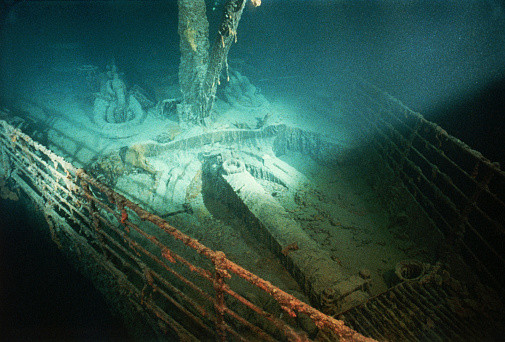
According to the U.S. Coast Guard, a deep-sea submersible carrying a crew of five people on a mission to explore the century-old wreckage of the Titanic has been found in fragments due to a "catastrophic implosion."
Sadly, all individuals aboard the submersible lost their lives in the incident.
The multinational search for the vessel, which lasted for five days, has now come to an end.
On Thursday morning, a remotely operated diving vehicle deployed from a Canadian ship discovered a debris field from the submersible named Titan.
The wreckage was located approximately 1,600 feet (488 meters) away from the bow of the Titanic, resting at a depth of 2 1/2 miles (4 km) beneath the surface.
Rear Admiral John Mauger of the U.S. Coast Guard informed reporters about the discovery in a remote area of the North Atlantic.
The submersible Titan, operated by the U.S.-based company OceanGate Expeditions, had been reported missing since it lost contact with its surface support ship on Sunday morning.
The incident occurred approximately one hour and 45 minutes into what was expected to be a two-hour dive to explore the renowned shipwreck.
The debris field resulting from the disintegration of the 22-foot (6.7-meter) Titan contained five significant fragments, according to the Coast Guard.
These fragments included the tail cone and two sections of the pressure hull of the vessel. However, it was not specified whether any human remains were observed.
Prior to the Coast Guard's official announcement, OceanGate released a statement confirming the absence of survivors among the five individuals onboard the Titan.
This included Stockton Rush, the founder and CEO of the company, who was piloting the submersible at the time of the incident.
"The debris field here is consistent with a catastrophic implosion of the vehicle," Mauger said.
The four others were British billionaire and explorer Hamish Harding, 58; Pakistani-born businessman Shahzada Dawood, 48, and his 19-year-old son, Suleman, both British citizens; and French oceanographer and renowned Titanic expert Paul-Henri Nargeolet, 77, who had visited the wreck dozens of times.
"These men were true explorers who shared a distinct spirit of adventure, and a deep passion for exploring and protecting the world's oceans," the company said. "Our hearts are with these five souls and every member of their families during this tragic time."
Teams and support personnel from the United States, Canada, France, and Britain dedicated several days to meticulously scanning thousands of square miles of open seas using planes and ships, in a concerted effort to locate any trace of the Titan.
The search received significant attention from the global media, capturing intense worldwide coverage. Consequently, the focus on this search operation largely overshadowed the aftermath of a more extensive maritime tragedy that occurred recently. This tragedy involved a migrant vessel wreck off the coast of Greece, resulting in the loss of hundreds of lives.
According to Rear Admiral Mauger, it was too early to determine the exact timing of the Titan's demise.
Search teams had deployed sonar buoys in the vicinity for over three days, but no distinct loud or violent noises associated with the implosion of the submersible were detected.
However, based on the proximity of the debris field to the shipwreck and the timing of the last communication with the Titan, it appeared likely that the failure occurred towards the end of its descent on Sunday.
These factors provided indications regarding the approximate time frame of the incident.
The U.S. Navy separately acknowledged that an analysis of its own acoustic data had detected "an anomaly consistent with an implosion or explosion" near the submersible's location when its communications were lost.
"While not definitive, this information was immediately shared" with commanders of the search mission, a senior Navy official said in a statement first quoted by the Wall Street Journal.
According to The Journal, which cited unnamed U.S. defense officials, a classified system specifically designed to detect enemy submarines captured the sound associated with the Titan's implosion.
In a Reuters interview conducted on Thursday, filmmaker James Cameron, renowned for directing the Oscar-winning movie "Titanic" and his personal exploration of the wreck using submersibles, revealed that he became aware of the acoustic evidence within a day and understood its implications.
"I sent emails to everybody I know and said we've lost some friends. The sub had imploded. It's on the bottom in pieces right now. I sent that out Monday morning," he recounted.
Sonar buoys deployed by aircraft detected certain sounds on Tuesday and Wednesday, which initially raised hopes that the Titan might have remained intact and that its occupants were alive, attempting to communicate by banging on the hull.
However, officials have determined that the analysis of the sound was inconclusive, and it is likely that the noises originated from another source rather than the submersible, Reuters reported.
The extensive search operation encompassed an area exceeding 10,000 square miles of the ocean.
To enhance the search efforts, two specialized deep-sea robot vehicles were deployed on Thursday, enabling an expansion of the search into the deeper regions of the ocean.
The mission faced significant challenges due to the immense pressure and complete darkness at those depths, making the operation more complex.
The fate of the tourist submersible garnered significant global attention, partly due to the enduring fascination surrounding the Titanic.
The British passenger liner, famously deemed "unsinkable," has captivated people's imagination for a century.
The story of the Titanic has been the subject of numerous nonfiction and fictional accounts, including the blockbuster movie "Titanic" released in 1997, which revitalized popular interest in the historical event.
© 2025 Latin Times. All rights reserved. Do not reproduce without permission.




